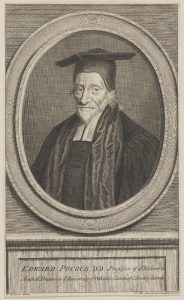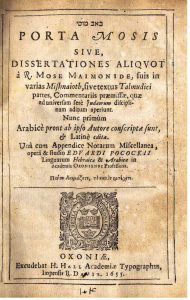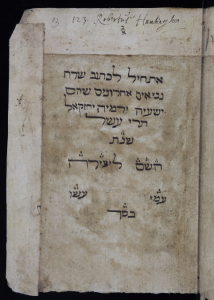by M.G. Wechsler

At the dawning of the 17th century, in England and the West generally, Arabic studies—and even more so the study of Jewish texts in Arabic—was still very much in its infancy. This was due in no small part to the relative paucity of Arabic manuscripts in Western libraries and the consequent limitations on access to Arabic texts faced by late-Renaissance scholars (whose interest in Arabic texts at this point was also largely dominated by ecclesiastical concerns and Bible translation in particular). Onto this scene stepped Edward Pococke (1604–91), an alumnus of Corpus Christi College at Oxford and ordained priest in the Church of England whose interest and training in Semitic languages ultimately led to his appointment as Oxford’s first (Laudian) Professor of Arabic. He also spent several years in Constantinople and Aleppo, during which time he collected hundreds of Oriental manuscripts (purchased by Oxford in 1693). Through his teaching, writing, and manuscript collecting Pococke thus played a seminal role in the European flowering of Arabic studies, facilitating Western scholarship’s exposure to and appreciation of the rich literary heritage of Arabic—and not only of Christian and Muslim Arabic literature, but also, even at that early stage, of Jewish Arabic literature, from which he cited profusely (both text and translation) in his published works.
Pococke’s pioneering activity in this field was first impressed upon me during the course of my work on an edition (published by Magnes, 2010) of the Judaeo-Arabic commentaries on Ruth and Esther by Tanḥum ha-Yerushalmi (d. 1291, Fustat), the last known exegete of the “rationalistic” school to write in Judaeo-Arabic. Pococke was the first to acquire manuscripts of Tanḥum’s work for western scholarship (including the unique manuscript on which my edition was based). He also was first to quote or refer to Tanḥum in publication (as he does more than 200 times in his Porta Mosis, which includes extracts from the Arabic commentary of Maimonides on the Mishnah, and commentaries on Hosea, Joel, Micah, and Malachi, all in the service of elucidating the biblical text). When preparing the bibliography of Karaite Arabic Bible translation for Biblia Arabica, I was reminded anew of Pococke’s industry in filling this seminal role, this time in utilizing the anonymous recension of Yefet b. Eli’s Judaeo-Arabic translation of the Latter Prophets contained in Ms. Huntington 206 of the Bodleian Library.

The first to actually recognize the translation in this manuscript as that of Yefet was not Pococke, but the American scholar and well-known editor/translator of synagogue liturgy Philip Birnbaum (1904–88). He discussed this attribution in his edition (comprising his PhD dissertation) of Yefet’s commentary on Hosea (pp. l–lvii). There he signals in a footnote (p. li, n. 118) that Pococke “was the first to make use of this manuscript in his commentary on Hosea (Oxford, 1685).”
Once alerted to this fact, I eagerly turned to Pococke’s works to see exactly what use he had made of the manuscript and found that he had in fact utilized it in all four of his commentaries on the Minor Prophets, beginning with Micah and Malachi (both published in 1677), followed by Hosea (1685) and then Joel (1691). Since the study of Karaism—especially its Judaeo-Arabic heritage—was still in its infancy among European Christian scholars in Pococke’s day, he neither identified the translation with Yefet (though he knew the name Yefet from Ibn Ezra; cf. his comm. on Micah 6:9) nor even raised the possibility of its Karaite provenance, but instead left its authorship in question, noting its divergence from the Judaeo-Arabic translation of Saadia while affirming its “antiquity” (from his preface to Micah, p. ix):
There is no name of the author expressed (that I find) in the copy. Whether it be the work of R. Saadiah Haggaon … I have reason to doubt, seeing the prophecy of Isaiah, which is in the same volume, differs from what I find in another copy of that prophecy, which bears his name. And it is certain that others of the Jews, besides him, did translate the Scriptures (or part of them) into that language, and therefore if it be any where by me cited as his, it is not positively affirm’d, and I almost think it is not his. Whose ever it be, it seems to be of some antiquity, for it is not of late years that the Jews have used to write in Arabick, as formerly they did ….
Pococke’s vacillation regarding the Saadianic authorship of this manuscript—and the degree to which he was hampered on this matter by his unfamiliarity with the Karaite Judaeo-Arabic heritage (most manuscript sources of which were still beyond the reach of Western scholarship)—is indeed reflected throughout his commentaries, where his citations from the manuscript are prefaced by statements ranging from probable attribution to Saadia (as in his comment on Micah 1:8: “And with him agreeth an Arab version of Rabbi Saadias (as is probable) …”) to non-Saadianic anonymity (as in his comment on Joel 2:29: “in the same manner doth the Arabick MS. Version understand it”). In one instance—comprising Pococke’s lengthiest citation from this manuscript that I’ve found—he gives not only the entire Judaeo-Arabic translation of the verse (Hosea 6:9), but also the exegetical note that follows it in the manuscript, after which he takes the opportunity to adduce further evidence for Saadia’s authorship:
This Translation, and this Note, seems an argument that this Translation is R. Saadiah’s, tho’ in the copy that we use, we find not his name expressed; because R. David Kimchi takes notice that by R. Saadiah the word כחכי Cechacce was so rendered ….
Of course, had Pococke been familiar with Yefet’s work on Hosea, he would have known that both the translation and the “note” were his (the latter being an abridged extract from Yefet’s full comment), regardless of whether the famous Provençal scholar David Qimḥi (ca. 1160–ca. 1235) is right that the same interpretation was shared by Saadia. In the passage of his commentary on Hosea to which Pococke refers, Qimḥi himself likely had Yefet in mind—though as elsewhere, and like other medieval Rabbanite exegetes, he refrains from explicitly identifying his Karaite source(s)—since he prefaces the view with attribution to “interpreters” (ויש מפרשים), and only after giving the view notes that Saadia interpreted the passage likewise (וכן פירשו רב סעדיה גאון ז״ל). That Saadia did indeed hold this view, moreover, may be open to question, considering that the only testimony to such (at least according to Ratzaby, מפירושי רב סעדיה למקרא) is Qimḥi’s comment—assuming also that the concluding attribution to Saadia is genuinely his.
At any rate, as Pococke’s use of this manuscript bears out, the printed history of Judaeo-Arabic Bible translation—both Karaite and Rabbanite—as well as the contribution of such to the history of biblical interpretation, extends well beyond discrete editions, chrestomathic excerpts, and devoted studies of Judaeo-Arabic translation to the much smaller citations tucked away and hidden from view amidst the pages of works dealing with more comprehensive topics than translation alone—including early modern works, like Pococke’s biblical commentaries, printed more than three centuries ago.
Michael G. Wechsler is a full professor in the Bible Program at the Moody Bible Institute in Chicago. His current research centers on the publication of Judaeo-Arabic exegetical literature as well as the study of the intercommunal and interconfessional interplay of ideas more generally reflected in Near-Eastern exegetical literature (Jewish and Christian).
Suggested Citation: M. G. Wechsler, “Edward Pococke and the Emergence of (Judaeo-) Arabic Studies in Late-Renaissance Europe”, Biblia Arabica Blog, 29 January 2019, DOI: https://doi.org/10.5282/ubm/epub.121796/.



Joan Wechsler
Your teachers always told me that you are a genius. As your mother, I was always so proud my kind, hard working, precious son. You always did everything so well. When I worked at your high school I would introduce myself as Michael Wechsler’s mother. When you received 13 and spoke at your graduation you made me so proud. Most of all I love you for the fine man that you are
Michael`
Thanks mom!